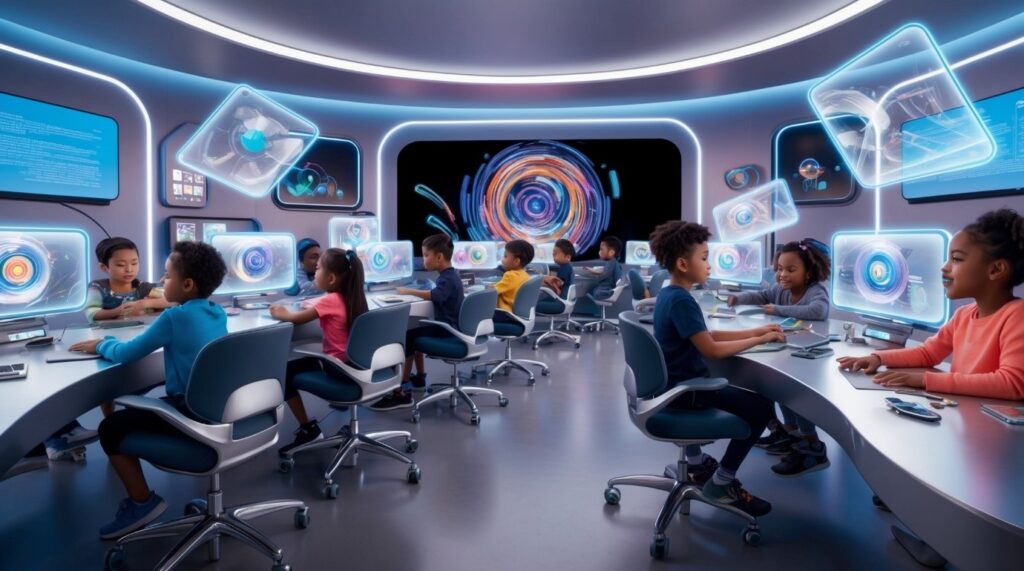Best Educational Coding Games for Kids Ages 8-12 in 2025
Are you ready to turn your child’s screen time into a launchpad for future success? Learning to code has never been more critical—or more fun! Coding games for kids combine education with entertainment, transforming learning into a memorable adventure. With these interactive games, kids aged 8-12 can develop problem-solving, logical thinking, and creativity while preparing for a future where tech skills are indispensable.
Let’s explore why coding matters and review some of the best real-world coding games that your child can start playing today!

Serving up a balanced meal—time to unplug and savor the moments together, without distractions
Why Coding Skills Are Essential for Kids
Preparing for Tomorrow’s Careers
The demand for coding and computational thinking skills is rapidly growing. By 2030, many careers will require digital fluency and problem-solving skills that are foundational in coding. It’s not just about learning to program—it’s about building the ability to analyze and solve complex problems, collaborate on projects, and innovate in any field.
Dr. Emily Chen, Educational Technology Expert, shares:
“Coding teaches kids how to think critically and solve problems. These skills are transferable to any career or life challenge.”
Empowering Creativity and Confidence
Coding Games for Kids transform programming from a technical skill into a vibrant form of self-expression. Whether designing a game, animating a story, or building an app, kids learn to bring their ideas to life through play. This creative process not only fosters confidence in their abilities but also builds resilience as they problem-solve and innovate.
Turning Consumers into Creators
In today’s digital age, children are surrounded by apps, games, and technology. By learning to code, they move from simply using technology to creating it, becoming active participants in the digital world.

Unlocking creativity one code at a time—where problem-solving meets imagination!
For tips on managing digital habits, check out How to Set Up Screen Time Limits on Android Devices: Reclaim Family Time to help balance technology and creativity.
How Coding Games Make Learning Fun
Turning Consumers into Creators
Coding games present coding concepts in an engaging format that feels more like a game than a lesson. Kids tackle challenges, solve puzzles, and complete quests—all while learning essential programming skills.
Why They Work

Levelling up in coding—where creativity and problem-solving lead to victory!
Top Real Coding Games for Kids Ages 8-12
Here’s a curated list of the best coding games that bring education and entertainment together:
|
Game |
Age Range |
Platform |
Coding Concepts |
Why It’s Awesome |
|
Scratch |
8-16 |
PC, Mac, Tablet |
Loops, conditionals, creativity |
Perfect for beginners to create stories and games. |
|
Minecraft: Education Edition |
8-14 |
PC, Mac, Tablet |
Logical thinking, coding basics |
Combines coding with world-building adventures. |
|
CodeCombat |
9-16 |
Browser-based |
Python, JavaScript, loops |
Medieval fantasy coding adventures |
|
Tynker |
7-14 |
PC, Mobile, Tablet |
Block coding, game design |
Offers projects from simple games to Python apps |
|
Robo-Race: Code Warriors |
10-12 |
PC, Console |
Logic, AI basics |
Program robots to compete in strategy challenges |
1. Scratch
Scratch, developed by MIT, is one of the most popular coding platforms for kids. Using a block-based coding system, kids can create animations, games, and interactive stories. Its drag-and-drop interface makes it ideal for beginners, and kids can immediately see their code come to life.
Why It’s Great: Scratch’s community allows kids to share projects and learn from others, fostering collaboration and creativity.
Parent Tip: Encourage your child to remix existing projects to learn new skills and spark creativity.

Bringing imagination to life—coding a playful adventure in a digital world!
2. Minecraft: Education Edition
Minecraft: Education Edition combines the popular world-building game with coding challenges. Through in-game activities, kids can learn concepts like logic gates, automation, and conditional statements using the in-built Code Builder tool.
Why It’s Great: Minecraft bridges the gap between play and learning, keeping kids engaged while fostering creativity and teamwork.
Parent Tip: Pair Minecraft coding sessions with discussions about real-world engineering or architectural concepts.
3. CodeCombat
CodeCombat teaches real programming languages like Python and JavaScript through a medieval-themed game. Kids write actual code to guide their characters through dungeons, collect treasures, and defeat enemies.
Why It’s Great: By using text-based coding, CodeCombat prepares kids for advanced programming while keeping the process fun and immersive.
Testimonial:
“My daughter learned Python basics through CodeCombat and later used those skills to create her own mini-game,” says Michelle, a proud parent.

Coding your way through adventure—where every line unlocks new levels of creativity!
4. Tynker
Tynker offers a variety of coding projects, from creating simple games to programming drones and robots. Its structured lessons guide kids from beginner to advanced levels, introducing them to both block-based and text-based coding.
Why It’s Great: Tynker provides a progression path, ensuring kids can start simple and move on to real-world programming languages.
Parent Tip: Check out Tynker’s coding challenges, like creating animated stories or developing mini-games.
5. Robo-Race: Code Warriors
Platforms: PC, Console
Coding Concepts: AI basics, logic, strategy
Robo-Race immerses kids in the world of robotics and artificial intelligence. Players program their robots to compete in challenges, emphasizing logic and pattern recognition.
Why It’s Great: Robo-Race introduces AI concepts in an approachable way, helping kids understand the technology behind self-driving cars, smart assistants, and more.
Parent Tip: Discuss how robotics and AI are shaping industries like healthcare, transportation, and entertainment.

Code, compete, conquer! Kids cheering as their robot races to victory with clever strategies.
1. Coding Olympics
Host family coding challenges:
2. Create Digital Art
Encourage kids to use coding platforms like Scratch or Tynker to create digital art. Display their work in a virtual art gallery for friends and family to admire.
3. Real-Life Coding Detectives
Turn daily active ities into coding lessons:
Tips for Parents to Support Learning
1. Code Together: Learn the basics alongside your child to show support.
2. Celebrate Progress: Use a rewards system to recognize milestones.
3. Show Real-World Applications: Discuss how coding powers the technology they use daily.
4. Normalize Mistakes: Teach kids that debugging is a valuable part of the process.
FAQs for Parents
How Do I Balance Screen Time?
Set specific time slots for coding and establish screen-free zones, like the dinner table. Learn more about managing screen time by checking out How to Set Up Screen Time Limits on Android Devices:
Reclaim Family Time.
How Can I Ensure Online Safety?
Choose kid-friendly platforms and discuss internet safety regularly. For more tips on balancing screen time, see our article on Balancing Screen Time and Digital Wellness.

Suggested Image: A parent guiding a child through coding on a tablet.
Final Thoughts: From Players to Creators
Coding Games for Kids inspire critical thinking, problem-solving, and creativity—turning screen time into a growth opportunity. Celebrate every bug fixed and app created; these small wins help your child grow into a confident young coder. As you nurture their coding journey, prioritize balance between learning and play. For more ways to support safe exploration of Coding Games for Kids, explore our guide to Top 10 Parental Control Apps for iPhone.

Learning in the future—where coding and holograms come together to spark creativity and innovation!
Ready for More STEM Activities?
Check out our guide: [Top STEM Apps for Preschoolers: Building a Foundation for Future Innovators].
Let’s get coding!
By integrating fun coding games into your child’s screen time, you not only engage them in exciting learning experiences but also help them develop critical future skills. And as you embark on this educational journey, consider the importance of screen time management and explore resources like: How to Choose the Right App and Monitoring and Adjusting: Stay Flexible, Parents!.

